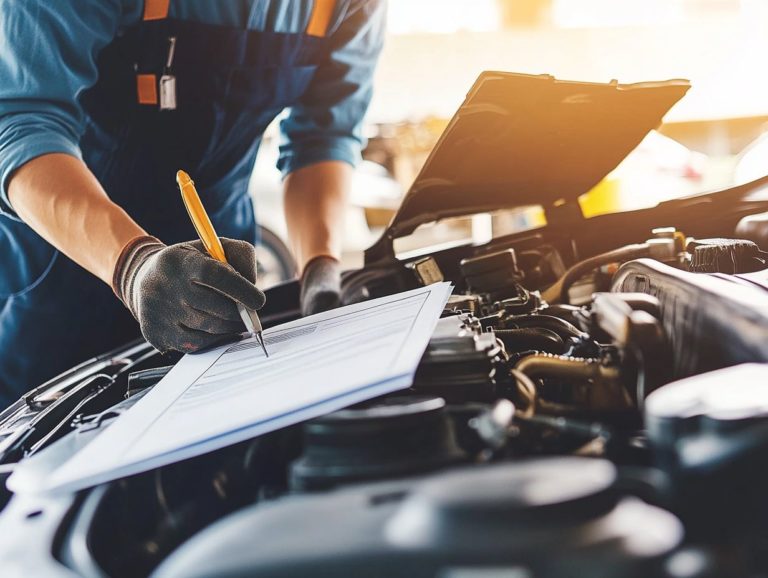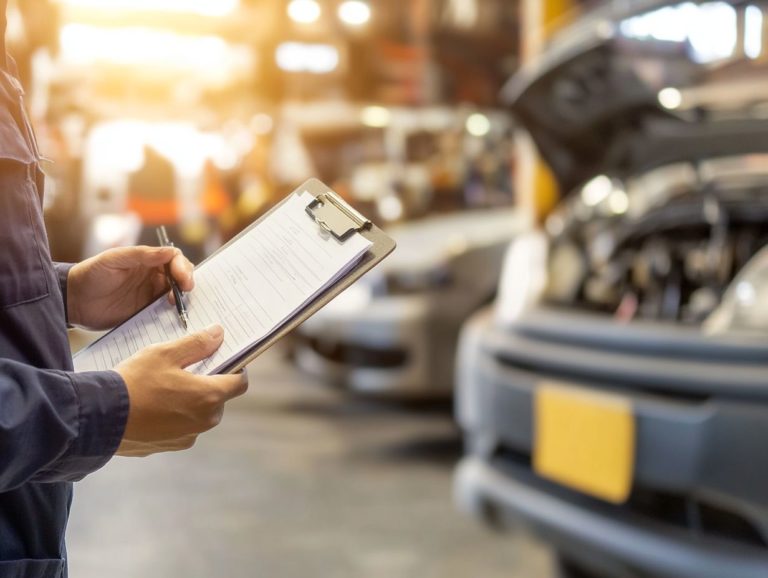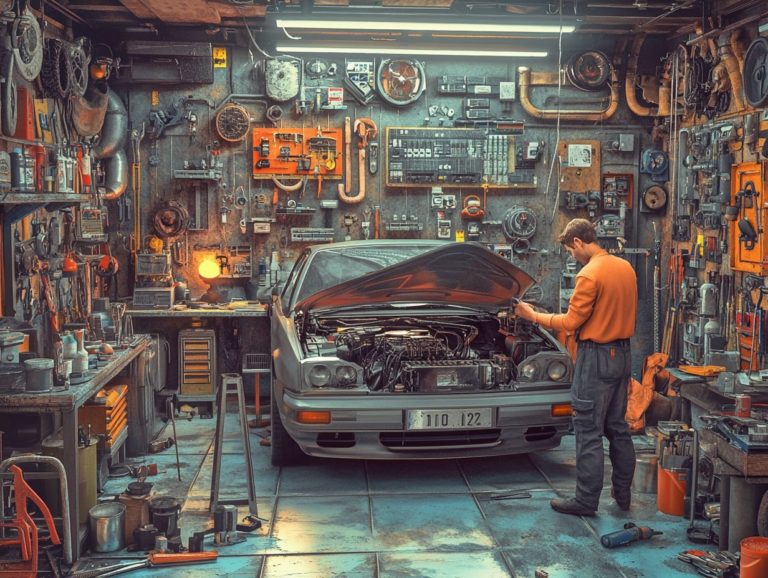How to Maintain Your Brakes for Safety
Maintaining your brakes is vital for both your safety and the longevity of your vehicle. Don’t wait! Keep your brakes in top shape and enjoy a safer driving experience!
Regular brake maintenance is crucial. It helps you spot warning signs that indicate your brakes need attention. You ll discover simple DIY maintenance tasks you can easily handle at home, along with guidance on when it s best to bring in the professionals.
This guide covers common brake problems and provides valuable tips to extend the life of your brakes. Stay safe on the road by ensuring your brakes are always in top shape!
Contents
- Key Takeaways:
- The Importance of Brake Maintenance
- Signs that Your Brakes Need Attention
- DIY Brake Maintenance
- Professional Brake Maintenance
- Common Brake Problems and Solutions
- Tips for Extending the Life of Your Brakes
- Frequently Asked Questions
- What are some signs that my brakes need maintenance for safety?
- How often should I check my brakes for safety?
- Can I maintain my brakes for safety on my own?
- What are some important parts of the brake system to maintain for safety?
- How can I make my brakes last longer for safety?
- What should I do if my brakes feel different or less responsive than usual?
Key Takeaways:

- Regular brake checks save lives and prevent accidents.
- Watch for signs like squeaking, grinding, or a soft brake pedal they signal it’s time for maintenance.
- Simple tasks like checking fluid levels can help keep your brakes in top condition and extend their life!
The Importance of Brake Maintenance
Brake maintenance is crucial for ensuring the safety and performance of your vehicle’s braking system. Understanding the importance of brake fluid maintenance through regular inspections can prevent brake failure and significantly enhance your driving safety.
Worn brake pads, low brake fluid, and neglected brake lines can create dangerous situations, leading to spongy brake pedals and reduced braking efficiency. Your vehicle’s brake system includes the components that help your car stop, making it imperative to prioritize brake maintenance in your automotive care routine.
Consulting with automotive technicians for brake servicing will help you mitigate potential risks associated with neglecting this essential upkeep.
Why Regular Maintenance is Crucial for Safety
Regular brake maintenance is essential for your safety and the safety of others on the road. Understanding the importance of regular brake inspections directly impacts the reliability of your brake system.
By sticking to a proper maintenance schedule, you can significantly reduce the risks associated with brake failure, which often leads to hazardous driving conditions. Common brake maintenance tasks include:
- Checking fluid levels
- Inspecting brake pads and rotors for wear
- Ensuring that brake lines are free from leaks or damage
These checks should ideally be performed every 6,000 to 10,000 miles to catch any potential issues before they escalate.
Engaging a professional brake technician for regular assessments not only provides you with expert insights but also ensures that any necessary repairs are executed promptly, promoting long-term safety and performance for your vehicle.
Signs that Your Brakes Need Attention
Recognizing the signs that your brakes require attention is essential for maintaining optimal braking performance. By staying vigilant, you can address potential issues before they escalate, ensuring a smoother and safer driving experience.
Recognizing Warning Signs
Paying attention to specific symptoms is crucial for your safety on the road. If you hear a screeching or grinding sound when applying the brakes, it often signals that the brake pads are worn and need immediate attention.
You might also notice unusual vibrations or pulsations in the brake pedal. These can indicate problems with the brake rotors or other components. Additionally, visible leaks from the brake lines or a dashboard warning light glowing like a neon sign are clear indicators that it’s time for servicing.
By being proactive and scheduling regular brake checks, you ensure optimal performance and enhance your overall safety while driving.
DIY Brake Maintenance

Engaging in DIY brake maintenance offers you a rewarding opportunity to save money while ensuring your vehicle s safety. However, it demands a solid understanding of essential procedures, such as changing brake pads and performing a brake fluid flush.
Simple Maintenance Tasks You Can Do at Home
You can easily perform several maintenance tasks at home to keep your brake system in top condition. This includes cleaning the brakes and changing the brake pads.
Regularly inspecting your brake pads for wear is crucial. It helps catch potential issues before they turn into bigger problems.
Keep an eye out for uneven wear or thinning, as these can compromise your braking power.
Cleaning the brake components is just as important. By removing dust and debris from calipers and rotors, you ensure they perform at their best.
Establishing a routine for effective brake checks is essential. Test the responsiveness of your brakes and listen for any unusual sounds. This proactive approach can help you detect issues early on.
And remember, it s always wise to consult a professional mechanic for any complex problems or uncertainties to keep you safe on the road.
Professional Brake Maintenance
To ensure that your vehicle’s brake system operates at peak efficiency, enlisting the help of professional brake maintenance is paramount. This is especially true for complex issues that demand the expertise of qualified brake technicians.
Prioritizing this level of care not only enhances your safety but also prolongs the lifespan of your vehicle’s braking system.
When to Seek Professional Help
Recognizing when to seek professional help for brake issues is vital for both your vehicle s performance and your safety on the road.
Certain situations demand your immediate attention. Look out for persistent brake problems that seem to get worse, unusual noises such as squeaking or grinding when you brake, or a noticeable drop in braking power that could lead to perilous conditions.
Don t overlook these warning signs; they could save your life! These symptoms may point to underlying issues requiring expert intervention.
Regular brake inspections by certified technicians not only help you catch potential problems early but also ensure your vehicle remains reliable and safe for your daily commutes. This makes it a critical part of your vehicle maintenance routine.
Common Brake Problems and Solutions
Grasping the nuances of common brake problems and their respective solutions is essential for ensuring both the safety and efficiency of your vehicle’s brake system.
Identifying and Addressing Common Issues

Identifying and addressing common brake issues, such as brake noise and worn components, is crucial for ensuring optimal braking performance.
Regarding your vehicle’s safety, being attuned to symptoms like squeaking, grinding, or pulling to one side while braking is vital. These signs often hint at underlying problems such as worn brake pads, damaged rotors, or issues with the brake fluid.
The causes can vary, from everyday wear and tear to the consequences of neglecting regular maintenance schedules. To effectively address these concerns, it s wise to consult with a qualified mechanic who can provide a thorough assessment.
Regular brake checks not only enhance your safety but also extend the lifespan of your brake components. This ultimately saves you both time and money in the long run.
Tips for Extending the Life of Your Brakes
To extend the life of your brakes and elevate your vehicle’s safety, it’s essential to embrace the importance of regular brake maintenance through key tips and best practices.
Best Practices for Maintaining Your Brakes
Implementing best practices for maintaining your brakes not only enhances their efficiency but also safeguards the safety of everyone on the road, including understanding the basics of brake fluid maintenance.
Regular attention to brake upkeep can lead to noteworthy improvements in your vehicle’s performance and longevity.
Establishing a maintenance schedule is essential; it enables you to be proactive rather than reactive when brake issues arise.
Incorporating regular brake cleaning into your routine is another critical factor. Dust and debris can significantly affect braking power.
Additionally, keeping an eye on your driving habits like avoiding harsh braking and maintaining safe following distances plays a vital role in reducing unnecessary wear and tear on your brake components.
By embracing these practices, you not only enhance your own safety but also contribute to a safer driving environment for all.
Frequently Asked Questions
What are some signs that my brakes need maintenance for safety?
Watch out for squeaking or grinding noises when you brake. A spongy brake pedal, vibrations, or the car pulling to one side are also signs.
How often should I check my brakes for safety?

Check your brakes every 6 months or 6,000 miles. If you notice signs of brake issues, get them checked immediately!
Can I maintain my brakes for safety on my own?
You can do some basic maintenance yourself. However, it’s best to have a trained mechanic inspect and service your brakes to ensure maximum safety.
What are some important parts of the brake system to maintain for safety?
Key parts of your brake system to check often for safety include the brake pads, rotors, calipers, and brake lines. Don’t forget to check and replace the brake fluid as needed!
How can I make my brakes last longer for safety?
Follow your vehicle’s maintenance schedule and avoid harsh braking or sudden stops. Additionally, maintaining your vehicle’s safety features is crucial. Keep your tires properly inflated! This not only boosts your safety but also helps your brakes last longer.
What should I do if my brakes feel different or less responsive than usual?
If your brakes feel different, don’t wait! Get them checked by a mechanic immediately. Ignoring potential issues can compromise your safety and the safety of others on the road.




